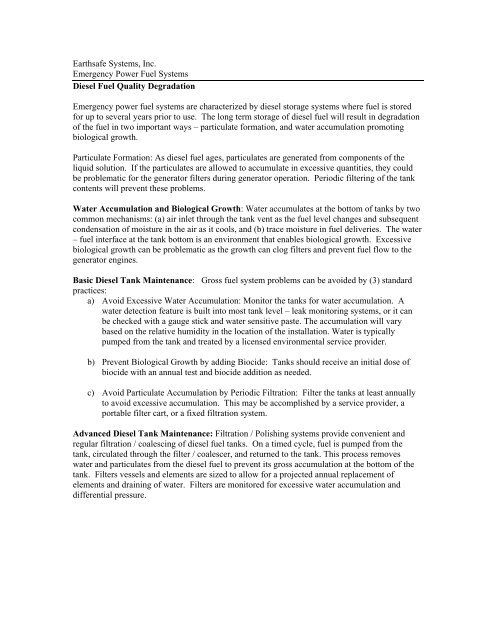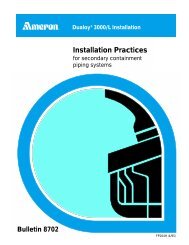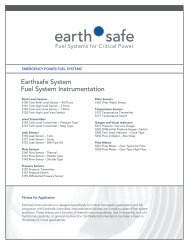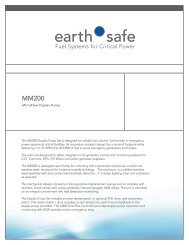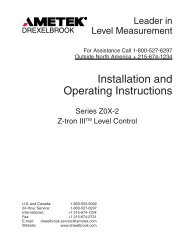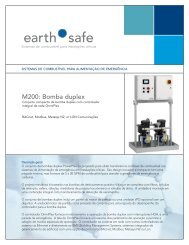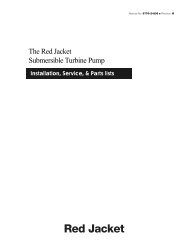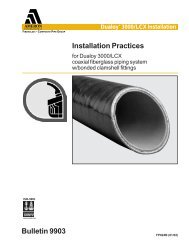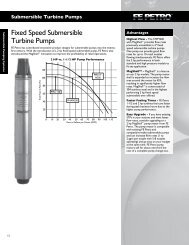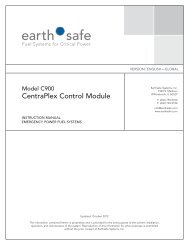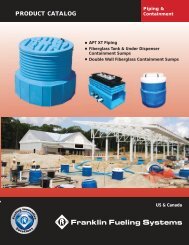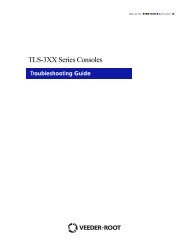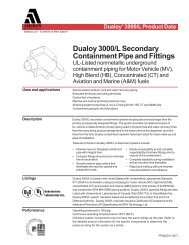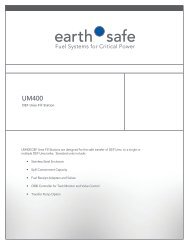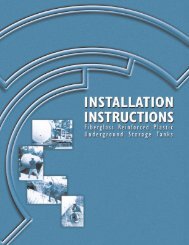M300.T02 Biocide Recommendations - Earthsafe Systems, Inc.
M300.T02 Biocide Recommendations - Earthsafe Systems, Inc.
M300.T02 Biocide Recommendations - Earthsafe Systems, Inc.
You also want an ePaper? Increase the reach of your titles
YUMPU automatically turns print PDFs into web optimized ePapers that Google loves.
<strong>Earthsafe</strong> <strong>Systems</strong>, <strong>Inc</strong>.<br />
Emergency Power Fuel <strong>Systems</strong><br />
Diesel Fuel Quality Degradation<br />
Emergency power fuel systems are characterized by diesel storage systems where fuel is stored<br />
for up to several years prior to use. The long term storage of diesel fuel will result in degradation<br />
of the fuel in two important ways – particulate formation, and water accumulation promoting<br />
biological growth.<br />
Particulate Formation: As diesel fuel ages, particulates are generated from components of the<br />
liquid solution. If the particulates are allowed to accumulate in excessive quantities, they could<br />
be problematic for the generator filters during generator operation. Periodic filtering of the tank<br />
contents will prevent these problems.<br />
Water Accumulation and Biological Growth: Water accumulates at the bottom of tanks by two<br />
common mechanisms: (a) air inlet through the tank vent as the fuel level changes and subsequent<br />
condensation of moisture in the air as it cools, and (b) trace moisture in fuel deliveries. The water<br />
– fuel interface at the tank bottom is an environment that enables biological growth. Excessive<br />
biological growth can be problematic as the growth can clog filters and prevent fuel flow to the<br />
generator engines.<br />
Basic Diesel Tank Maintenance: Gross fuel system problems can be avoided by (3) standard<br />
practices:<br />
a) Avoid Excessive Water Accumulation: Monitor the tanks for water accumulation. A<br />
water detection feature is built into most tank level – leak monitoring systems, or it can<br />
be checked with a gauge stick and water sensitive paste. The accumulation will vary<br />
based on the relative humidity in the location of the installation. Water is typically<br />
pumped from the tank and treated by a licensed environmental service provider.<br />
b) Prevent Biological Growth by adding <strong>Biocide</strong>: Tanks should receive an initial dose of<br />
biocide with an annual test and biocide addition as needed.<br />
c) Avoid Particulate Accumulation by Periodic Filtration: Filter the tanks at least annually<br />
to avoid excessive accumulation. This may be accomplished by a service provider, a<br />
portable filter cart, or a fixed filtration system.<br />
Advanced Diesel Tank Maintenance: Filtration / Polishing systems provide convenient and<br />
regular filtration / coalescing of diesel fuel tanks. On a timed cycle, fuel is pumped from the<br />
tank, circulated through the filter / coalescer, and returned to the tank. This process removes<br />
water and particulates from the diesel fuel to prevent its gross accumulation at the bottom of the<br />
tank. Filters vessels and elements are sized to allow for a projected annual replacement of<br />
elements and draining of water. Filters are monitored for excessive water accumulation and<br />
differential pressure.
<strong>Earthsafe</strong> <strong>Systems</strong>, <strong>Inc</strong>.<br />
Emergency Power Fuel <strong>Systems</strong><br />
Diesel Fuel Quality Degradation<br />
Common Questions:<br />
What is the recommended micron level for filter – coalescer<br />
Filter elements should be sized for 10 micron for both particulate removal and water coalescing.<br />
Up to 25 micron would still be in the range of reasonable practice. Removal to 1 or 2 micron<br />
levels is sometimes promoted as “polishing”, however it leads to excessive maintenance without<br />
significant benefit. The final filter at the generator will provide any additional level of filtration<br />
needed to meet the engine manufacturer’s requirements.<br />
What is the recommended timing settings for automatic filtration systems<br />
The timer settings for automatic operation are typically set for a complete turnover of the full tank<br />
contents every month. For example a 10,000 gallon tank with a 20 GPM filter pump will require<br />
about 8 hours of filtration.<br />
What is a recommended <strong>Biocide</strong><br />
A standard biocide product is Kathon FP1.5 (Rohm Haas) with is available from a US distributor<br />
at www.fqsinc.com . Racor Filtration also has a biocide product which is available from its local<br />
distributors. The dosage rate will vary with the product but a first estimate would be 1 gallon per<br />
10,000 gallons of diesel.<br />
When should tanks be tested and re-treated<br />
Tanks should be tested for biological problems at least annually, and biocide added in accordance<br />
with the test results. Sample and test kits are available from www.fqsinc.com or local testing<br />
services may be recommended from your local fuel supplier.


